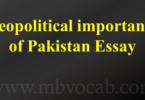Exploring the Peculiarities of Pakistani Society
i. The Enigma of an Islamic Society
Central to the fabric of Pakistani society lies the profound influence of the Islamic faith. Non-believers, those who do not embrace the concept of the singular divinity and revere the Holy Prophet Muhammad as the final Messenger of Allah, are regarded as non-Muslims. Despite a kaleidoscope of ethnic and linguistic distinctions, the shared religious foundation fosters a deep sense of camaraderie among the populace.
ii. Linguistic Richness
Urdu stands as the preeminent national language in Pakistan. Beyond this linguistic linchpin, a tapestry of regional dialects and languages, including Punjabi, Saraiki, Balochi, Brahui, Pashto, Sindhi, and Potohari, further enriches the linguistic diversity. Urdu, the lingua franca, serves as the common thread binding people across the expanse of the nation.
iii. The Mosaic of Livelihoods
Agriculture predominates as the vocation of choice for the majority of the population. In stark contrast, the industrial and commercial sectors languish with a dearth of requisite personnel. An upsurge in economic consciousness has spurred women to actively seek employment, diversifying their roles beyond the confines of education and healthcare.
iv. Attire: A Kaleidoscope of Styles
A myriad of indigenous garb adorns our society, with a penchant for the Shalwar Kameez being widespread. In tandem with this staple, varying attires tailored to the demands of local climates and seasons grace the diverse regions of the nation.
V. A Gastronomic Tapestry
Culinary preferences in Pakistan pivot around a delectable array of victuals, attuned to the geographical and climatic nuances of each locale. Staples such as wheat bread, rice, vegetables, meat, and pulses form the culinary bedrock.
vi. Celebrations: A Medley of Religious and National Observances
The cultural calendar of Pakistani society resonates with religious fervor during Eid-ul-Fitr, Eid-ul-Azha, Shab-e-Baraat, and Eid Milad-un-Nabi. These celebrations are marked by exuberance and zeal.
Beyond religious occasions, the nation enthusiastically commemorates its independence, with festivities on Pakistan Day, Independence Day, Quaid-e-Azam Day, and Allama Iqbal Day. Additionally, regional festivities, Urse, and fairs capture the imaginations of people across social strata and age groups.
vii. Traditions and Customs: A Quilt of Diversity
The mores of Islamic faith pervade our society, influencing pivotal life events such as weddings, births, and funerals. However, the tapestry of cultural customs and traditions is woven with unique regional threads, resulting in delightful variations from one corner of the nation to another.







